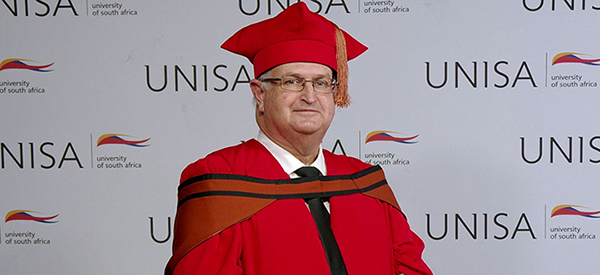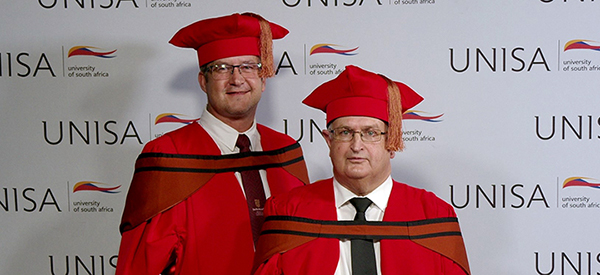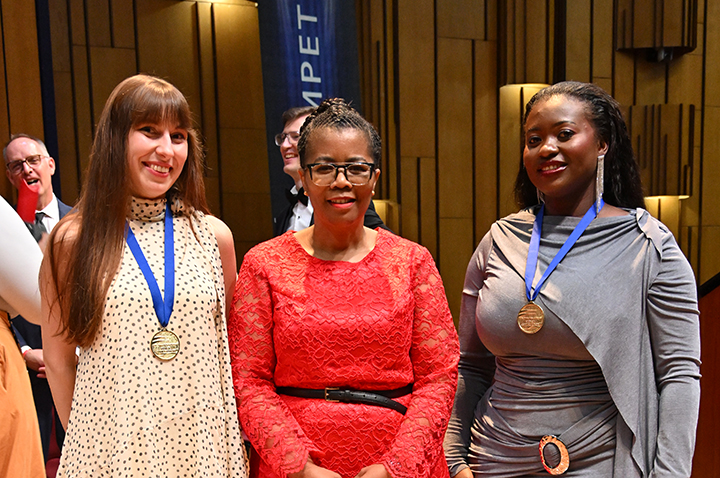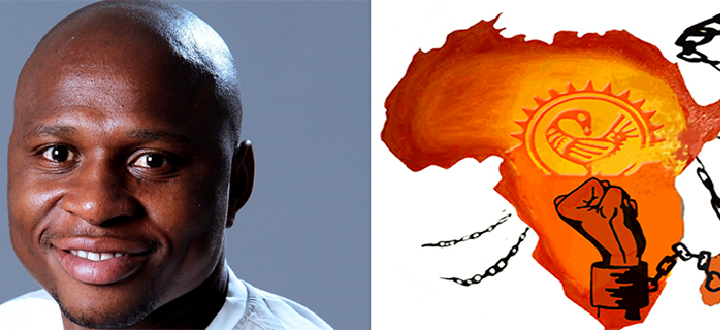
Equipped with state-of-the-art laboratories that provide students with hands-on experiences to bridge theory and practice
In his enthralling inaugural lecture held at Unisa on 26 May 2025 themed Viewing the World Differently: Bullets, Flowers and the Advantage of a Geography Education, Prof H.A.P. Smit from the Unisa Department of Geography, College of Agriculture and Environmental Sciences (CAES), challenged the audience to view the world differently, through a geographical lens that blends military insight, environmental ethics and human empathy, and, additionally, to discover how spatial thinking, personal stories and academic depth come together to shape a powerful vision for education and sustainable development. Smit is celebrated for his work in Military Geography, Environmental Literacy and Geography Education.

Prof H.A.P. Smit
Smit grew up in Leeukloof at a small family farm in the Southern Cape near Mossel Bay, situated in the foothills of the Outeniqua Mountains. The landscape features he experienced as a child led him to become a geographer, even though he did not know the geographical terms until later.
Geography did not interest him in his school subject selection. His plan to leave boys-only classes pushed him toward choosing touch-typing as a subject. He received his assignment to a different class because of the available resources. The school principal, F.P.J. Smit, inspired him to choose geography as a subject, and the young Smit joined the geography class with mild hesitation. Ultimately, though, it became his future profession despite his initial lack of enthusiasm for the subject.
During the lecture, Smit presented a strong argument about the geographical way of thinking. Geographers, he said, have better vision when they observe spatial arrangements and establish links between elements, as well as explain the locations and conditions of geographical phenomena.
According to Smit, spatial thinking functions as the base for human thought because, he says, "it controls our comprehension of time as well as society and language." Through his geographical perspective, he shared these concepts with the audience using, examples and humorous anecdotes at times and quoted from German philosopher Immanuel Kant.
Smit encouraged the audience to perceive geography beyond its educational subject and physical science definitions because it provides essential insights into contemporary world complexities. The lecture covered how military training areas with environmental damage function as educational sites for peace-building and environmental protection. Geography education consists of more than memorising maps and capital cities. People must understand how different elements connect through environments, historical backgrounds and future projections. The education should system develop a thought process that recognises bullets alongside flowers and teaches students to adapt their responses to both.
The audience reacted positively to his presentation by praising his effective connection between academic theory, personal experience and practical applications.
Smit’s insights resonated deeply with attendees and were further reflected by Dr Ivan Henrico, Acting Vice-Dean and School Chair of the Faculty of Military Science at Stellenbosch University. Henrico praised Smit for his scholarly depth and his ability to bridge theory and application, particularly within the realm of military geography, environmental ethics, and spatial awareness: "Smit’s work challenges us to see military spaces not only through strategic lenses, but also as opportunities for education, reflection, and environmental responsibility," he stated.

Prof H.A.P. Smit and Dr Ivan Henrico
Prof Solomon Magano, Vice-Principal: Institutional Development, praised Smit for his contributions. "The educational work of Smit demonstrates how Unisa pursues knowledge development for community service. His teachings make us ponder how education connects to both location and human existence," he stated.
Prof Ntanganedzeni Mapholi, Acting Executive Dean of the College of Agriculture and Environmental Sciences, expressed agreement with these comments by declaring the occasion a source of college pride. "Education, particularly geographic education, serves as the foundation for sustainable development," she said.
Smit’s educational approach shows students how to apply scholarly concepts to real-world contexts within their communities. Smit's lecture solidified his position as a leading thinker in geography while demonstrating Unisa's dedication to academic excellence and both innovation and public scholarship.
The current environmental and social challenges in South Africa and across the world make his message extremely relevant because geographical education produces individuals who can develop strategic solutions for change and have empathy with people and communities impacted by environmental issues.
* By Gugu Masinga, Marketing and Communications Specialist, College of Agriculture and Environmental Sciences
Publish date: 2025/06/03
 Unisa celebrates a project of hope, dignity and student success
Unisa celebrates a project of hope, dignity and student success
 Women vocalists take top honours at Unisa's globally renowned showcase
Women vocalists take top honours at Unisa's globally renowned showcase
 African wealth is dependent on investment in education and development
African wealth is dependent on investment in education and development
 Unisa celebrates matric result success at Correctional Services ceremony
Unisa celebrates matric result success at Correctional Services ceremony
 Unisa ICT Director recognised among acclaimed IT leaders
Unisa ICT Director recognised among acclaimed IT leaders